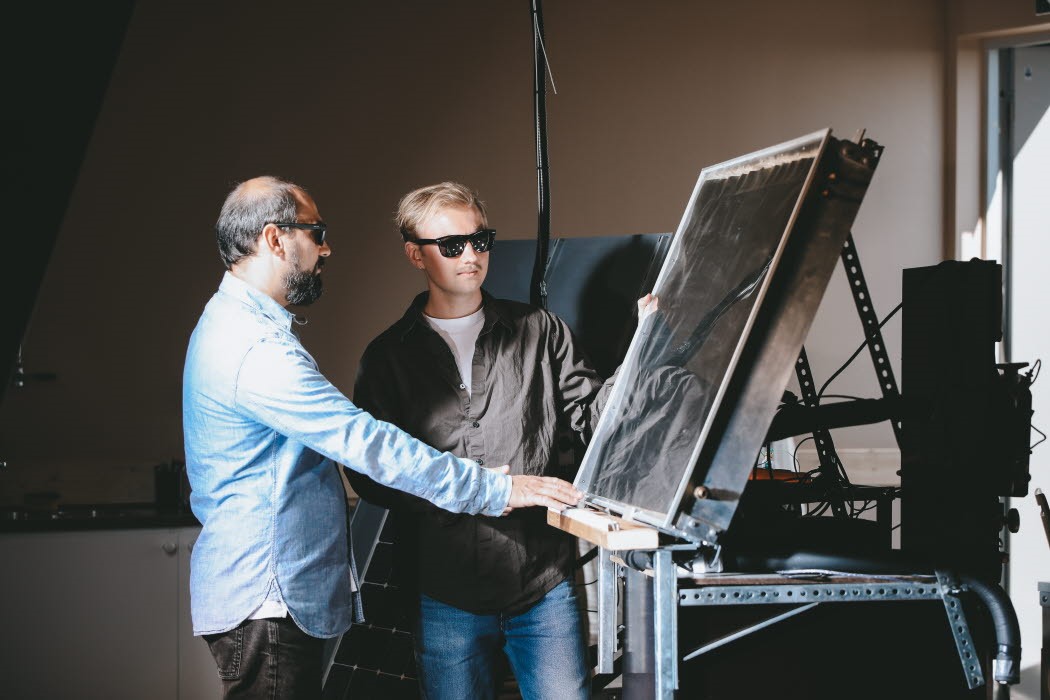
About the Research Group
Our research group was established in 1984, initially known as the Solar Energy Research Centre, with a primary focus on solar energy research. Since then, we have broadened our scope to encompass entire energy systems. This includes both electrical and thermal systems, as well as their integration into the built environment, while advancing circular economy principles, including the use of more sustainable construction materials and techniques.
Our research is highly multidisciplinary and deeply embedded in society, which means there is a great deal of collaboration with private and public stakeholders and with academic institutions throughout the world. We have a high level of implementation in our region, in Sweden, in Scandinavia and in Europe. Our commitment lies in meeting present-day needs while safeguarding the well-being of future generations.
Our Research
Our research is structured into three interrelated areas: Energy Systems and Technologies, Large Scale Energy Systems, and Built Environment. In Energy Systems and Technologies, we conduct research on photovoltaic systems, hybrid systems (thermal and electrical), and batteries.
In Large Scale Energy Systems, we focus on developing flexible energy systems to integrate more renewables into cities and industries, while also enhancing our energy infrastructure to accommodate the growing demand for electric vehicles.
In Built Environment, our aim is to reduce the carbon footprint of buildings through energy efficiency and the use of more sustainable construction materials. Here, we also conduct research on urban planning.
Photovoltaic Systems: Increasing photovoltaics (PV) adoption, especially in Nordic climates, requires understanding component performance in real-world conditions and studying solutions for easier integration into the built environment. Our testing facilities monitor performance, energy yield, degradation rates, and fault identification across entire PV systems, including modules, power electronics, mounting structures, and installation details. We also study coupling solutions with other systems, such as batteries and potential use for hydrogen production.
Thermal & Hybrid Systems: Achieving energy efficiency in complex systems requires understanding of component characteristics and interactions. Components like solar thermal and photovoltaic systems, heat pumps, storage tanks, and batteries require assessment through measurements, modeling, and simulations. Our testing facilities employ emulators, physical components, and advanced control strategies for accelerated testing and validation of hybrid systems.
Battery Systems: Extending battery deployment for storage and grid support relies on understanding battery performance in real-world conditions and within larger energy systems. Our test facilities focus on developing methodologies to aid the battery industry and other energy sector stakeholders in achieving a more efficient and resilient energy system.
Energy Integration and Flexibility: Seamless integration of renewable energy, waste heat, and storage, promotes more flexible energy systems. This approach enhances sustainability through gains in efficiency and larger share of renewables, diversifies the energy mix, strengthens power infrastructure, and ensures a secure energy supply.
Positive Energy District (PED): PED´s concept is one step further in sustainability by generating surplus energy. By harnessing renewable resources, integrated storage solutions, and energy-efficient technologies, they actively combat climate change and facilitate regenerative energy production.
Energy-Efficient Industrial Heating: Integration of renewable energy, storage, and innovative industrial heating solutions, to enhance energy efficiency and financial returns, while minimizing environmental impact of industries.
Electrical Mobility: Enabling the integration of growing electric vehicle (EV) fleets into current energy systems and infrastructure via optimized distributed energy systems. Key research areas include smart EV charging for grid optimization, cost reduction, control, and coupling between electricity and heating sectors.
Community Energy-Sharing: Advancing the adoption of distributed and renewable energy systems within building communities through Peer-to-Peer (P2P) energy sharing and sector coupling contributes to the decarbonization of the energy sector at local, national, and international levels.
Sustainable buildings: Enhancing circular economy principles and energy efficiency across building lifecycles is our focus. Using digital tools, demonstration pilot projects, and life cycle assessments (LCA), we develop methods to improve building energy efficiency and reduce environmental impacts. Our commitment extends to achieving net-zero whole-life carbon in buildings by prioritizing materials reuse, recycling, and repurposing existing structures.
Urban Planning: Multi-disciplinary research centered around sustainable urban development, with a holistic perspective that encompasses the entire city, placing emphasis on aspects such as resilience, energy efficiency, and strategies for mitigating climate change.
Research Projects
You can click the title of the research project you are interested in to find the project leader who is also the contact for that specific project.
Feasibility study of the steam heat pump system for sustainable transition of industrial heating in Sweden: a case study in plastic extrusion process
Start: 2023-08-01
Solar power sharing building community, Smart electric vehicle charging, Community-to- Vehicle-to-Community (C2V2C)
Start: 2023-01-01
Auto characterization of PEDs for digital references towards iterative process optimisation (PED-ACT)
Start: 2022-10-01
Solar district heating with pit storage for Swedish conditions
Start: 2022-10-01
Integrative lighting asset management for public libraries using Digital Twins
Start: 2022-09-15
PED-Swedish participation in IEA EBC Annex 83 Positive Energy Districts (PED)
Start: 2021-02-23
Agent-GIS-5GDHC: Techno-economic performance and feasibility study of the 5GDHC technology using agent based modelling and GIS
Start: 2020-12-01
solEMC - Methods to detect and to prevent EMI from PV-cell installations
Start: 2020-10-01
ENSECO - Product and process for preparation and realisation of energy self-sufficient container buildings
Start: 2018-10-01
UBMEM - Activity-Based Urban Building and Mobility Energy Modeling for Planning of Future Cities
Start: 2018-10-01
Optimized renovation for efficient solar roof tops
Start: 2018-08-31
ecoINSIDE2
Start: 2018-07-01
Varsam energieffektiv renovering Tjärna ängar
Start: 2015-07-01
Publications
Cooperation
Members
Thomas Jungel
Industridoktorand miljövetenskap i forskarskolan Future proof cities
tju@du.se, thomas.jungell@kopparstaden.se